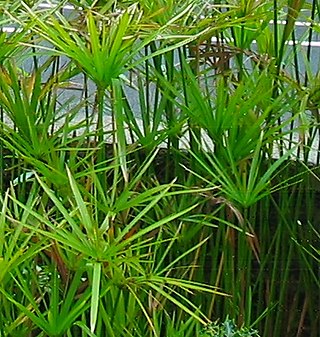
Cyperus papyrus, better known by the common names papyrus, papyrus sedge, paper reed, Indian matting plant, or Nile grass, is a species of aquatic flowering plant belonging to the sedge family Cyperaceae. It is a tender herbaceous perennial, native to Africa, and forms tall stands of reed-like swamp vegetation in shallow water.

Cyperus is a large genus of about 700 species of sedges, distributed throughout all continents in both tropical and temperate regions.

Cyperus rotundus is a species of sedge (Cyperaceae) native to Africa, southern and central Europe, and southern Asia. The word cyperus derives from the Greek κύπερος, kyperos, and rotundus is from Latin, meaning "round". The earliest attested form of the word cyperus is the Mycenaean Greek 𐀓𐀞𐀫, ku-pa-ro, written in Linear B syllabic script.

Cyperus alternifolius, the umbrella papyrus, umbrella sedge or umbrella palm, is a grass-like plant in the large genus Cyperus of the sedge family Cyperaceae. The plant is native to West Africa, Madagascar and the Arabian Peninsula, but widely distributed throughout the world. It has gained the Royal Horticultural Society's Award of Garden Merit. The subspecies Cyperus alternifolius ssp. flabelliformis is also known as Cyperus involucratusRottb..

Cyperus bulbosus is a species of sedge found across Africa, the Middle East, Indian subcontinent, Southeast Asia, and Australia. In Australia, it is commonly called Nalgoo or (Australian) bush onion or "wild onion", but is not related to the onion or other Alliaceae. It is a component of Australian bushfood, but is considered an agricultural weed in other areas.

Cyperus eragrostis is a species of sedge known by several common names, including tall flatsedge, nutgrass, tall nutgrass, umbrella sedge, chufa, Earth almond, zula nuts, edible galingale and pale galingale.

Cyperus difformis is a species of sedge known by several common names, including variable flatsedge, smallflower umbrella-sedge and rice sedge. This plant is native to southern Europe, most of Africa and Asia, and Australia, and it is naturalized in other areas of the world, including large parts of the Americas.

Cyperus fuscus is a species of sedge known by the common name brown galingale, or brown flatsedge. This plant is native to much of Europe, Asia and North Africa from England, Portugal and Morocco east to China and Thailand. It is an introduced species in North America, where it is naturalized in widely scattered locations in the United States and Canada.

Cyperus odoratus is a species of sedge known by the common names fragrant flatsedge and rusty flatsedge. This species is quite variable and may in fact be more than one species included under one name.

Cyperus squarrosus is a species of sedge known by several common names, including bearded flatsedge and awned flatsedge. It is found in wet environments in North and South America, Africa, Australia, southern Asia and Italy.

Cyperus laevigatus is a species of sedge known by the common name smooth flatsedge.

Cyriopagopus albostriatus, commonly known as Thailand zebra leg tarantula is a species of spider in the family Theraphosidae, found in Myanmar, Thailand, and Cambodia.

Cyperus articulatus is an aromatic species of sedge known by the common names jointed flatsedge and priprioca. It has also been known as Guinea rush or adrue. It grows as a perennial herb. It grows in water or near it in rivers, streams, lakes, and swamps with a hyperhydrate or possibly tenagophyte growth pattern. It is widespread across tropical and subtropical regions in Africa, southern Asia, northern Australia, the southeastern United States, the West Indies, and Latin America. While it is closely related to highly invasive sedges such as purple nut sedge, priprioca is less prolific and competitive than its relative.
Cyperus laxus is a sedge species in the Cyperaceae. It is native to tropical regions of the Western Hemisphere and also to Africa. The species is reportedly naturalized in Assam and the Andaman and Nicobar Islands.

Cyperus distans, also known as slender cyperus, is a species of sedge native to tropical and subtropical wetlands in sub-Saharan Africa, Asia, Madagascar, New Guinea, Australia, Latin America, the West Indies, the southeastern United States and various oceanic islands.

Cyperus longus is a species of sedge known by the common names of sweet cyperus and water rush in Africa, or in Britain galingale.

Cyperus compressus, commonly known as annual sedge, is a sedge of the family Cyperaceae that has a wide distribution throughout countries with warmer climates. It is found in tropical areas of Africa, Asia and the Americas.
Cyperus zollingeri, commonly known as roadside flatsedge, is a sedge of the family Cyperaceae that is native to tropical areas of Australia, Africa and Asia.
















